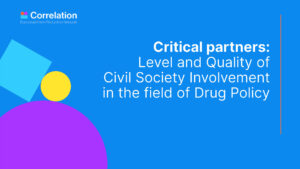An online study – conducted by Drugreporter – of more than 1100 Hungarian students revealed that there are serious problems with drug prevention in schools. It is provided mostly by police officers with outdated methods, focuses on scare tactics, and does not include much interaction with students.
An online questionnaire has been distributed (with the help of social media ads) among Hungarian young people who are attending high school or have finished secondary education within the last five years. There were 1133 valid responses. 95% of respondents were aged between 14 and 25 years, 50% of them girls. They represented all types of secondary education. Approximately one quarter of them went to school in Budapest.
Access to this article is free - but to produce articles and videos is not. Drugreporter is a non-profit website that needs your support to provide you with high quality contents.
According to the study, the most prevalent drug prevention delivery method used in Hungarian schools is lecturing (reported by 85% of respondents) and watching movies (32%). Interactive methods such as play/drama (10%) are much less prevalent, while personal (4%) or family (3%) counselling is a rarity. More than half of the students reported that the person who delivered the program was a police officer (54%), while only 42% of respondents reported other social professionals delivering the program.


We asked students to identify the subjects and themes of the drug prevention programs. The vast majority of programs focused on raising awareness of the dangers of drug use (82%), information about the types and effects of drugs (68%), raising awareness of the prohibition of substances (44%), and teaching students how to say no to drugs (40%). Only a minority of students reported programs on safer nightlife (30%), how to help other students with drug problems (27%), harm reduction (11%), or management of personal relations (9%).

The study showed that the majority of students believed that the program was credible and the person delivering the program knew what they were talking about. However, 43% of students did agree with the statement that the program exaggerated the harms of drugs, and only 9% fully agreed with the statement that the program has changed their opinion about drugs. 47% said they did not receive any answers to questions that kept them occupied for a long time. 32% agreed with the statement that the program was not in line with their personal experiences, and 49% disagreed with the statement that they could honestly talk about their experiences.

When we asked students to describe their feelings and thoughts about the program 240 young people responded. Most of them expressed negative opinions about the lack of credibility of the program, the outdated information they got or the outdated approach they used (“drugs are bad”), the perceived hypocrisy of the presenter (referring to their own legal drug use, such as tobacco and coffee), the lack of confidentiality (especially in the case of police officers), the exaggeration of harms, the lack of differentiation among the risks of different drugs (such as cannabis and heroin), and the fact there was no reference to the possibility of responsible use of illicit drugs and the ways to reduce harms.
Many respondents criticised the drug prevention program because it was simply boring and/or was not effective even if it was entertaining. Those who expressed positive opinions emphasised that the program was entertaining, interesting, and interactive – including honest discussion of the experiences of students. This is in line with international standards of drug prevention that emphasise that programs must be interactive and create a confidential atmosphere. It seems that there are good quality prevention programs in Hungarian schools – but they are the minority.
The report supports claims from civil society organisations that have been criticising the Hungarian government for prioritising law enforcement officials as deliverers of drug prevention programs in schools. The government created an accreditation system for school health programs that made it difficult for NGOs to enter schools with their programs – but this system does not apply to programs run by the police. As Drugreporter reported a few years ago, there are several pseudo-scientific initiatives in schools including a program run by the Church of Scientology that also enter schools without accreditation. Although the government claims it increased the budget for prevention, the quality of most of these programs is questionable.
Peter Sarosi







